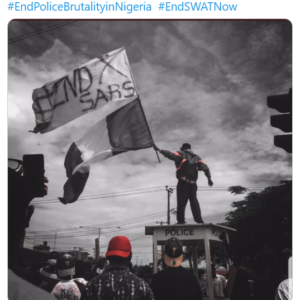By: Gerelyn Terzo for Sharemoney
Nigeria has awakened a sleeping giant — their youth. In a country with a population of roughly 206 million, 50% are under the age of 19. It is this segment of the population that has been behind the highly publicized protests around the country’s Special Anti-Robbery Squad, or SARS, which operates under Nigeria’s police force and is known to be corrupt.
The #EndSARS movement started on social media and has since taken the country by storm. Young Nigerians in their 20s and 30s have called for total disbandment of the police group, which they say has been performing the very criminal acts that they were tasked with eliminating, including harassment of innocent people, brutality and killings. The SARS representatives are said to be rogue officers who set up roadblocks and perform stop and search activities, which is where much of the harassment reportedly takes place.
Protestor Demands
The #EndSARS movement has given the Nigerian youth a way to express their resentment toward the government for all of these issues, chief among which has been police brutality. Roughly 60% of Nigerians are dissatisfied with how democracy is working in the country, according to the Pew Research Center.
Nigeria’s youth have a history of effective protesting, and were behind the beginning of the country’s independence movement. They are aware of the influence that they have and have upped the ante. In addition to banning SARS, they are making other demands, Brookings explained, one of which can be summarized as “equitable economic prosperity” both for the protestors and all of Nigeria’s citizens. They are calling for this reform in a number of ways.
To start, they want to see the protestors who have been arrested released in addition to compensation for the families of victims from SARS-related violence.
The protestors also demand a strengthening of the education and health systems. More than 13 million of Nigeria’s children are not attending school. The protestors want to see a state of emergency declared in education and a 50% increase in the budget allocated to this sector, followed by a doubling of that amount in the next two years.
In healthcare, they similarly are asking to see a 50% increase in the budget allocation to this sector as well as a state of emergency being declared. Along these lines, they are asking for a fund to be earmarked for the training of more professionals in the healthcare field.
Also, the protestors are asking for reform across youth affairs. They have watched from the sidelines the innovation that is taking place among millennials and Gen Z’ers across the world, which has resulted in the creation of some startups with unicorn status that are valued at over USD 1 billion. They want an equal opportunity to participate, however, in Nigeria this is less likely to occur because instilling confidence about the economy in investors and lenders is challenging.
Protestors are calling for a state of emergency and adequate funding across the Federal Ministry of Science & Technology and the Federal Ministry of Budget and National Planning. In addition, the protestors want to see funds earmarked for growing the agriculture industry in the country.
They are also demanding that a movement called the “Not Too Young to Run,” which is a bill designed to encourage young people to run for office, allowing for more youth under the age of 40 to be represented in every cabinet in the government.
Global Response
Protests escalated in October 2020 in response to a graphic video that emerged on social media that illustrated the brutality that has become the signature of the SARS police unit. In the video, the SARS officers are seen dragging a couple of men from a Lagos hotel, and hitting them with clubs on the streets. Peaceful protests erupted in the city, in response to which plainclothes officers reportedly began shooting into the crowd indiscriminately, killing several innocent people and wounding dozens.
Amnesty International Nigeria, which is for freedom, justice and equality,

Source: Twitter
The #EndSars movement has generated the support of people inside and outside of the country including celebrities such as Beyonce, U.S. President-elect Joe Biden, and Davido, a Nigerian singer who wants to “end this nonsense.” Wizkid, another Nigerian singer, is also calling for an end to police brutality.
Nigeria’s Economy
Nigeria’s oil-dependent economy has also fueled the protests amid a crippling recession from which the country has struggled to recover since 2016. Now President Muhammadu Buhari has warned that yet another recession is imminent.
The youth protestors were already emboldened by the corruption among “high-level elites,” soaring inflation and sky-high unemployment levels. Nigeria is suffering from a 27.1% unemployment rate, approximately 35% of which are young people between the ages of 15 and 34. Making matters worse, the Nigerian government has introduced higher gas prices and a tariff on electricity rates.
Now analysts worry about what Nigeria’s response to the #endSARS movement could mean for the economy, saying that “fiscally conservative policies” that were created to move the economy toward recovery could be abandoned in an attempt to stave off more opposition. The way that the government has responded to the protests with force has damaged its reputation domestically and internationally, which has only added to the uncertainty and exacerbated an already precarious situation.
Even without the protests, Nigeria’s economy was already reeling from a downturn in the oil market coupled with the economic slowdown resulting from the COVID-19 pandemic.
What Now?
The situation is complicated, with the Nigerian northerners and supporters of President Buhari asserting that the protests are being fueled by southerners who are looking to make the president appear bad more than any true complaints by the country’s youth. The protests have largely quieted down in response to the military clampdown in the streets. Meanwhile, the #endSARS movement is still alive and well on social media.

Source: Twitter
What happens next will largely depend on how the protestors and the country respond. The Nigerian government has vowed to reform the police force, but if they don’t follow through or if the changes are not comprehensive enough, it could ignite even more protests in the not-too-distant future.
